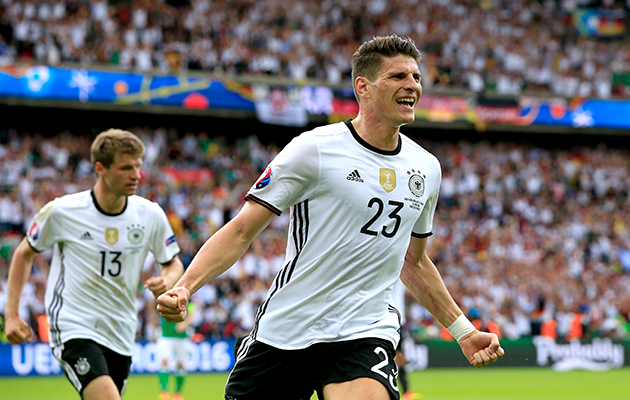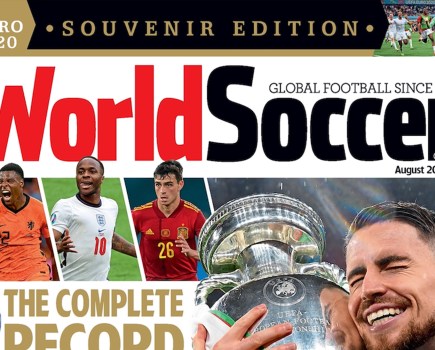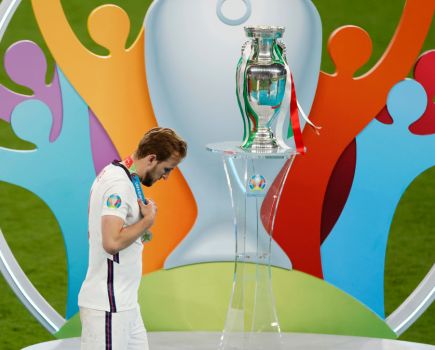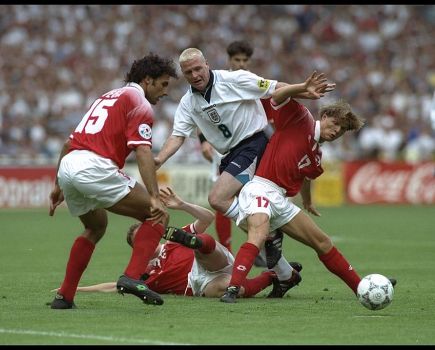1. Sharpshooter required. No previous experience necessary.
Ex-Germany keeper turned TV talking head, Oliver Kahn, was 100 per cent correct. Germany’s heartbreaking loss to France in the semi-finals of Euro 2016 essentially was down to one missing ingredient – insufficient cutting edge.
“We played some fantastic football in the first-half but couldn’t finish, ” said Kahn on ZDF television.
“We lack a predator up front. The keyword has to be penetration. It’s vital that we again start to develop real goal poachers. Why have we stopped regarding that sort of player as important ?”
A common sense appraisal. Without injured striker Mario Gomez, the German attack had no real point of reference against the French, eventually descending into one-dimensional sterility. Slick and attractive, but ultimately short of variety and end product. Strange that a team so bright, skilful and inventive should be so toothless up front.
In France, they only managed only one goal from open play (Bastian Schweinsteiger versus Ukraine) and in the three games in which they used a false nine (deploying either the out of form Thomas Müller or Mario Götze), they only scored twice. Oh for a Klinsmann, a Völler, a Gerd Müller. The hour has struck to change the blueprint.
2. France turn the tables
After his German side overcame France in the semi-final of the 1986 World Cup, former Bundestrainer, Franz Beckenbauer, famously declared that Les Bleus did not know how to beat the Nationalmannschaft.
And for well over half a century, that very much was the case, the Germans prevailing in every big tournament encounter. Too streetwise, too physically intimidating. Too disciplined, single-minded and hungry.
So how unnerving it must have been for the Deutschland old school to see the boot on the other foot in Marseille last week. Germany cast as the freewheeling ball-playing artists; France in grind-it-out mode, resiliently defying the wave upon wave of German attacks before taking advantage of two moments of German defensive madness: the Schweinsteiger ‘handball’ and the Kimmich-Neuer comedy of errors.
While extremely pleasing on the eye, Jogi Löw’s side does lack rigour and focus at times, their soft underbelly having much to do with their poor semi-final record of the past decade; losing four out of six since 2006. Hari-kari is not a good look.
3. Out of luck. Out of options. Out of here.

Antoine Griezmann celebrates scoring against Germany in the Euro 2016 semi-final.
Would it have made a difference to Germany’s fate if they had fielded a full-strength side against the French? Quite possibly. Thanks to the sidelining through injury of Gomez and midfield holder Sami Khedira and the suspension of centre-back, Mats Hummels, the Nationalmannschaft lost an awful lot of poise, presence and dynamism in one fell swoop and worthy as their replacements were, the damage to the team’s spine proved irreparable.
Some would argue, the German squad was short on depth. That beyond a wonderful first-eleven lay desert. Two years ago, when winning the world title, the contribution of impact substitutes – such as Götze and Andre Schürrle in the final against Argentina – was a key factor. Not this time though, the supposed second-stringers offering little in the way of game-changing boldness.
4. Sammer quits Bayern
In an unexpected development, Bayern Munich have announced the resignation of high-profile director of sport, Matthias Sammer.
The former German international libero and European Footballer of the Year for 1996 was diagnosed with a minor blood circulation problem in his brain three months ago and although now fully recovered, does not feel able to totally commit to his old job.
“The post of sporting director at Bayern means you have to serve the team, the club with all your energy seven days a week, 24 hours a day,” said Sammer. “At the moment I can’t meet those demands.”
Renowned for his intense competitiveness and straight talking, Sammer has been on the Bayern pay-roll for the past four years, joining them in 2012 following a stint as DFB technical chief.
For some critics, the ex-Dortmunder always was a fish out of water at Säbener Straße (Bayern’s HQ). Yet when it came to setting standards or telling home truths, there was no one better than the fiery Sammer. He’ll be missed.
5. Sweet home, Rhineland
Much-coveted Köln keeper, Timo Horn, has pledged to stay with his hometown club for at least another season, perhaps longer.
The 23-year-old, one of a stable of excellent young goalies in the Bundesliga, had been linked with Borussia Dortmund as well as a number of Premier League outfits, but wisely has chosen not to rush matters. After all, he already is on the fringes of the full German squad.
“It’s all about heart and feeling,” Horn told Bild. “It’s not just empty words. “







